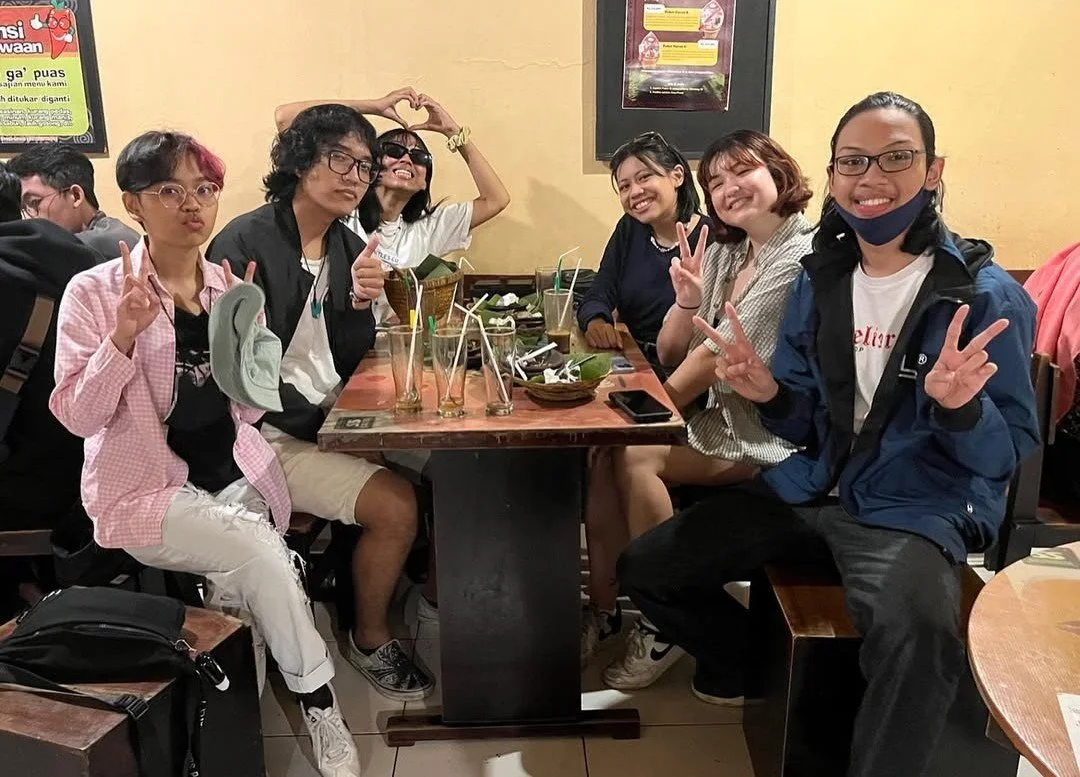
Jogjakarta, Indonesia
Gadjah Mada University
Enjoying a delicious meal on banana leaves with students.
This building houses the graduate program for Religious and Cross-Cultural Studies (CRCS)
Sam (‘21-’23) having dinner with FIB students.
Obie Cafe in Yogyakarta.
“My confidence and creativity as a teacher has grown exponentially, and I was thrilled this year to teach not only English language and writing classes, but also American Cultural Studies.”
For nearly 40 years, Shansi Fellows have immersed themselves in Indonesia by living and working at Gadjah Mada University in Yogyakarta. Through exposure to Indonesian language, Javanese culture, and this remarkable global city, Fellows develop lifelong personal attachments and passion for Indonesia. After completing their two-year Fellowships, many find it impossible to leave and remain in Indonesia to continue their work and studies.
Location
Yogyakarta is renowned as the hub of traditional Javanese culture and art, including music, dance, batik cloth dying, silverwork, and puppetry. This vibrant city and its surrounding area, home to roughly 3.5 million people, is saturated with universities and colleges, and brimming with young people. The pairing of Yogyakarta's traditional identity and nearby ancient temples with its friendly café culture and modern art galleries produces a creative and distinctive place to live and work.
About Gadjah Mada University
Gadjah Mada University (UGM) is the oldest and largest institution of higher education in Indonesia, and is considered one of the most prestigious research universities in the country. With approximately 51,000 students, UGM offers programs for undergraduate and graduate study, courses of study for professionals, vocational training, short courses, and online learning.
The Fellowship
The Fellows at UGM balance their time offering tutorials at two departments for a total of about 14 hours per week. At the Faculty of Cultural Studies, Fellows work as tutors of English, depending on the class, and lead a series of intensive writing workshops for English majors. They also coordinate cross-cultural extracurricular activities in collaboration with students and the department. At the Center for Religious and Cross-Cultural Studies (CRCS), Fellows teach English and work as writing tutors with students in this unique Master's program. CRCS is Indonesia's only interdisciplinary academic program focusing on religious studies at a secular university. Its emphasis on exploring different systems of beliefs and religious practices among faculty and students from diverse backgrounds makes it an exceptionally interesting place to engage.
Outside of work, Fellows participate in the rich educational, cultural, and social environment in Yogyakarta in many different ways. Some have studied traditional Javanese dance, while others have undertaken ethnographic research, including one who studied Javanese family myths. Another Fellow pursued environmental journalism, while a recent jazz musician formed a trio that performed in Yogyakarta and other parts of Indonesia.
What does a strong candidate for the Fellowship to UGM look like?
Some of our most successful Fellows to Yogyakarta had never studied Indonesia or traveled to Asia before their Fellowship, while others majored in East Asian Studies and were ardent students of Asian politics and culture. UGM is an excellent home for Shansi Fellows from all sorts of backgrounds, including those interested in Indonesia and Southeast Asia, arts and culture, politics and international development, or many other issues. For the UGM Fellowship, Shansi is looking for people who are creative and flexible thinkers, are interested in teaching, and are passionate about intercultural learning and sharing.
This Fellowship has led Shansi alumni down many career paths. Past Fellows have pursued graduate study in public health, economics and public policy, among other areas, while others embarked on careers in finance, business consulting, and journalism.
Language Training
Fellows receive intensive Indonesian language training with the Alam Bahasa Indonesia (Indonesia Language School) in Yogyakarta, Indonesia during the summer before they start their work at Gadjah Mada University. Tuition, book, travel, and living expenses during the period of the language training are covered by Shansi. Once the Fellowship begins, Shansi provides an allowance for language study for the remainder of the Fellowship.
Housing
In the first year of the Fellowship, Shansi Fellows live in an apartment provided by the university. For the second year of the Fellowship, the Fellow is expected to live independently in Yogyakarta (the incoming Fellow takes over the university apartment), and receives a housing allowance from Shansi. Some Fellows have elected to live alone in an apartment while other fellows have chosen to share a house with Indonesian roommates. Being a respected member of a community is very important, and it is important to note that cohabitating with roommates of the opposite gender is not permissible in most areas. A Fellow would need to seek advice from the university and neighbors before such an arrangement was made.
Calendar
Fellows at UGM arrive in Indonesia in June for language study and are on site in early or mid August. There is usually a winter break and vacation during the summer months.





